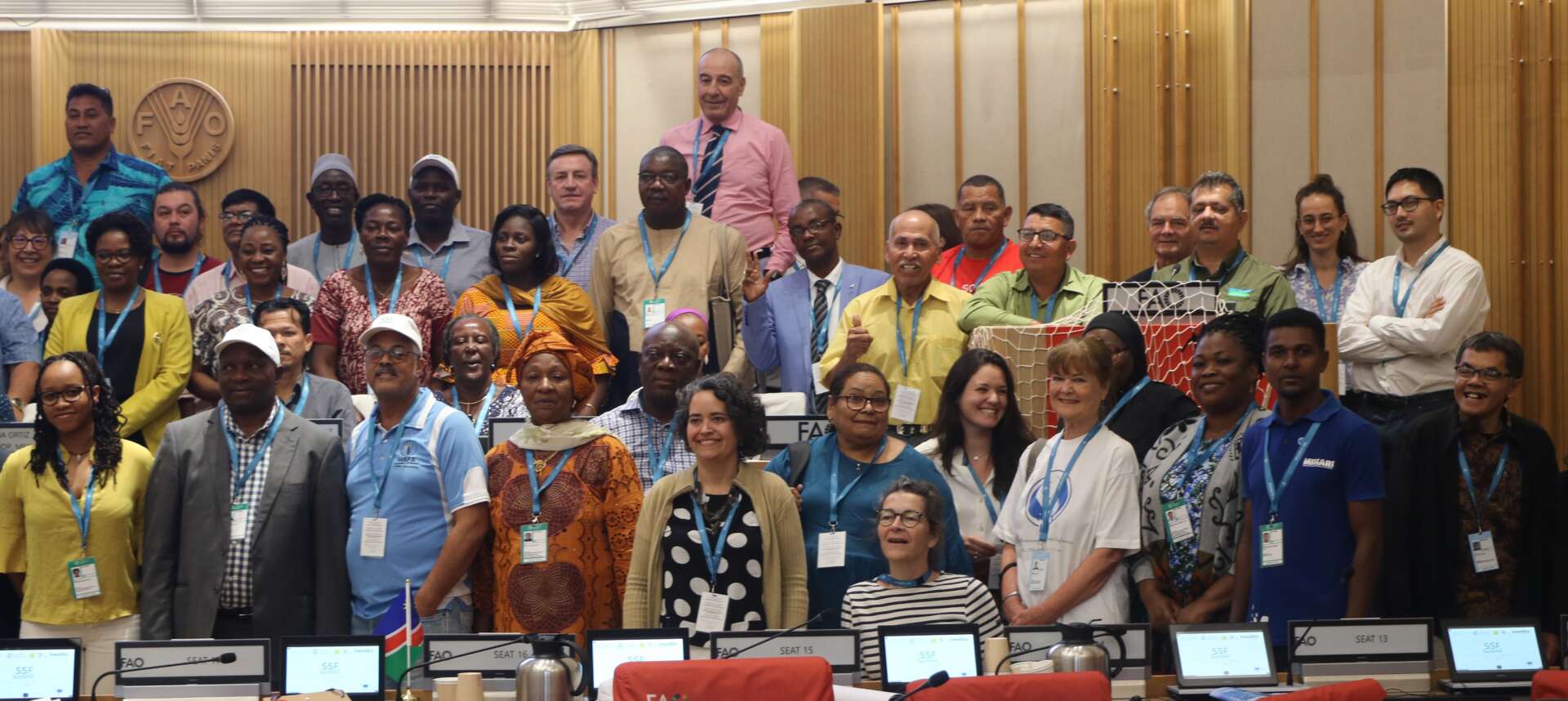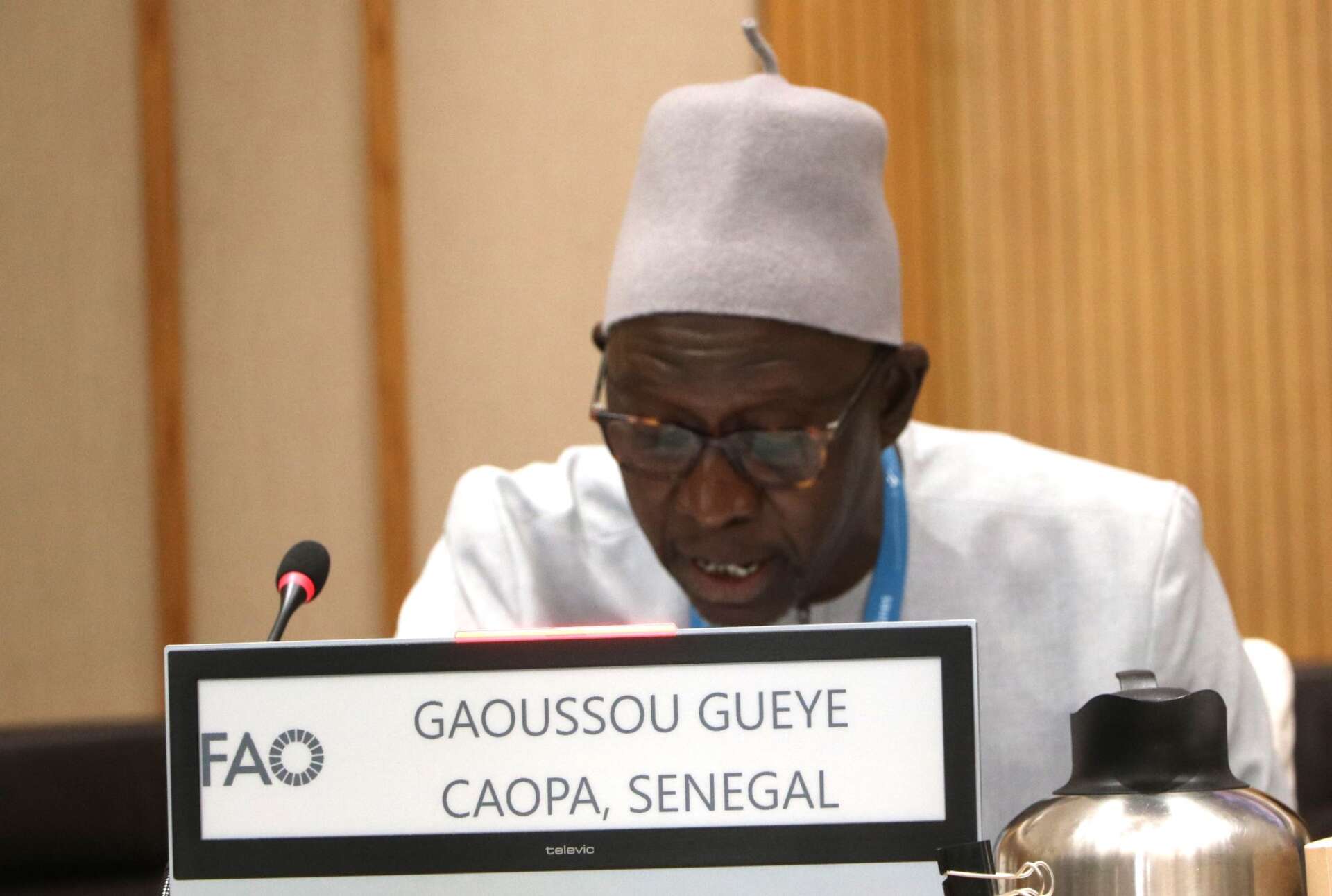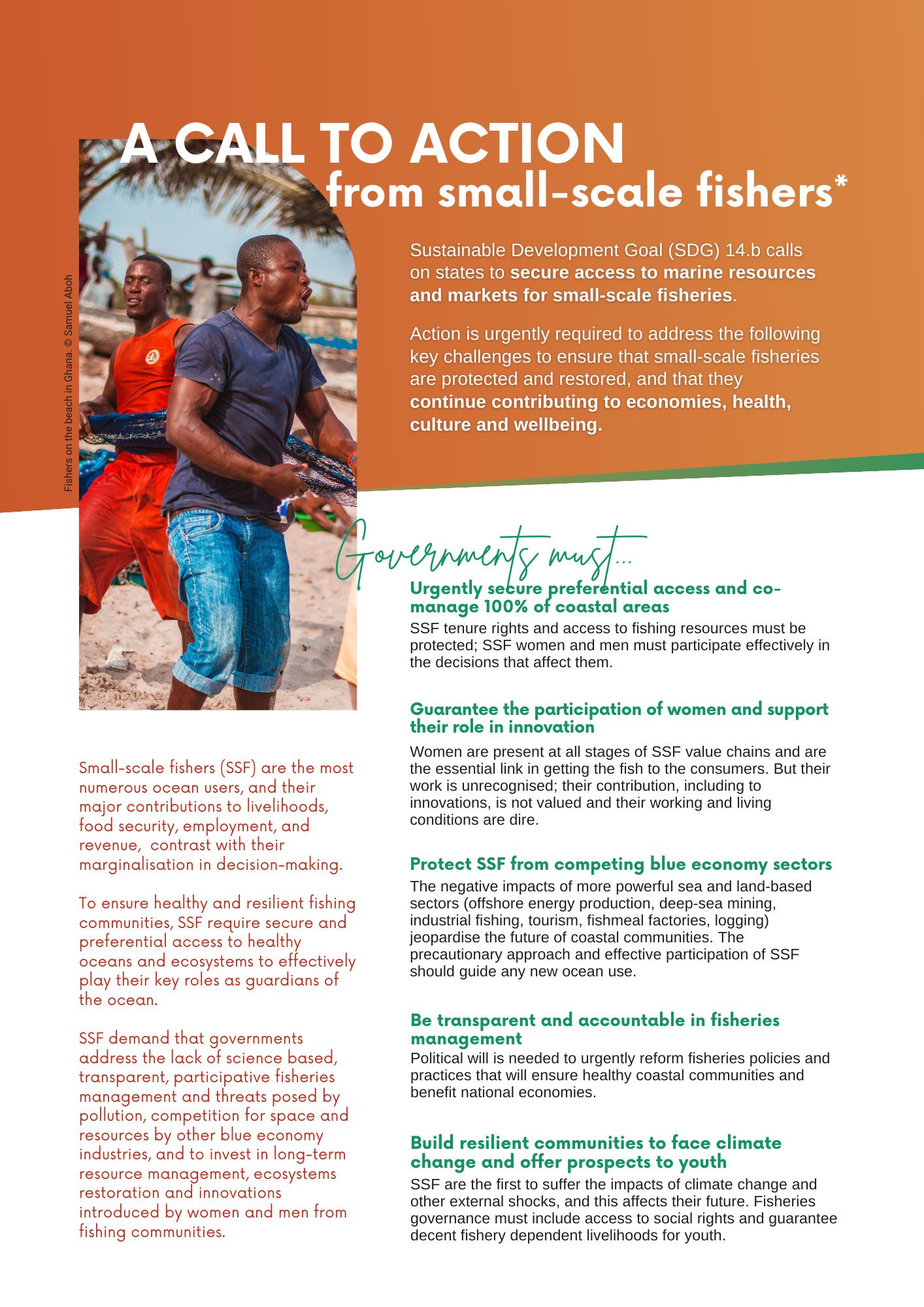The 2nd Artisanal Fisheries Summit is underway at the FAO headquarters in Rome, commemorating the 10th anniversary of the Voluntary Guidelines.
In his speech, the president of CAOPA and AFRIFISH-Net, Gaoussou Gueye, paid tribute to Chandrika Sharma, highlighted the urgency of the climate situation and overexploitation of resources, and called for action to implement the Guidelines.
He also emphasized the importance of recognizing women’s land rights in artisanal fisheries, both at sea and on land, and the challenges they face, including marginalization in resource management systems and frequent exclusion from land ownership rights.

Read the full speech here:
Dear colleagues from the small-scale fishing industry,
Ladies and Gentlemen,
In 2014, the adoption of the Small-Scale Fisheries Guidelines was the culmination of a long process that saw the unprecedented participation of more than 4,000 artisanal fishing women and men from around the world.
One person in particular worked tirelessly to develop these guidelines in a participatory and inclusive manner, with the sole aim of improving the living and working conditions of small-scale fishers: the late Ms Chandrika Sharma, Executive Secretary of the International Collective in Support of Fishworkers, ICSF.
Chandrika, who lost her life when the Malaysia Airlines Flight MH370 disappeared in March 2014, dedicated her life to small-scale fishing communities around the world. Chandrika was an energetic, cheerful and humble person. She had an in-depth knowledge of fisheries issues, nurtured by many field trips.
In the international forums where I have had the opportunity to meet her, she has always pleaded for decision-makers to adopt a human rights-based approach when it comes to policies affecting the small-scale fishing sector. She took every opportunity to emphasise the role and essential contribution of women in small-scale fishing. She also tirelessly pointed out that fishers have a special relationship with the natural world around them and are the first to be involved in conserving ecosystems, since they depend on them for their livelihood.
The fact that the Small-Scale Fisheries Guidelines are dedicated to the memory of Chandrika Sharma is a fitting tribute to her commitment.
But the greatest tribute we can pay to her is to fight together, the men and women of the small-scale fishing industry, to ensure that these guidelines are implemented in our countries and improve our living and working conditions.
This year, the Small-Scale Fisheries Summit and the Fisheries Committee that will follow, will give us the opportunity to do just that.
Why do we have to fight?
Because time is running out. Climate change, which is eroding our coasts, is literally on our doorstep. The effects of climate change, combined with the overexploitation of resources, mean that fish are deserting our nets, our women no longer have fish to process and the populations of our countries, deprived of this essential food, are going hungry.
More than ever, we need to come together to ensure that strong action is taken as a matter of urgency to enable our communities to face up to the difficulties and to give our children a future.
In 2022, 25 artisanal fisheries networks and professional organisations from Africa, Asia, the Pacific, North America, Central America, Latin America and Europe have jointly agreed to call to action all governments to accelerate the implementation of the Small-Scale Fisheries Guidelines.
CAOPA, which brings together men and women from 29 African countries who work in the small-scale maritime and continental fishing industry, has joined forces.
In this call to action available in 7 languages (French, English, Spanish, Arabic, Portuguese, Swahili and Wolof) we are first asking that access to resources for artisanal fishing communities be guaranteed and protected. This can be done, for example, by reserving an area for the exclusive use of small-scale fishing.
In this context, we recognise that marine protected areas can be effective means of restoring and conserving biodiversity and supporting coastal communities that depend on fishing for their livelihoods and food security.
At the United Nations Biodiversity Conference, governments adopted the target of declaring 30% of the world’s land and oceans as protected areas by 2030. This initiative is known as 30 x 30. However, in our view, the success of the 30 x 30 initiative will depend on participatory and transparent approaches to locating these zones and drawing up rules on the activities that are permitted there.
Historically, through traditional systems, the small-scale fishing sector was the first to take measures to protect fragile coastal areas or fish breeding grounds. These measures, such as banning fishing in certain areas or during certain seasons, were well respected by community members and proved to be effective in conserving ecosystems. Many fishing communities therefore have a rich and varied experience of nature conservation. In the discussions on this subject that will take place at the FAO Committee on Fisheries, it is important that this experience is recognised and valued – our States must recognise small-scale fishing communities as active partners in all conservation initiatives, including marine protected areas.
But for us, access rights in the fishing industry include not only the right to access fish resources, but also the right to access land in coastal areas. This is particularly important for women in artisanal fisheries.
In order to take account of the land rights of these women, it is necessary to examine their need for access both to the sea, for their harvesting and catching activities, and to the land, for their activities during the landing of catches, processing and marketing.
Land issues concerning housing are also important: the distance between home and place of work can affect women’s working and living conditions.
In many parts of the world, the land rights of coastal fishing communities are only marginally recognised. Women are particularly vulnerable because they rarely hold land ownership rights.
They are also often excluded from management systems for access to fishing resources, and in many cases are unable to inherit property or land rights.
Another priority of the call to action launched in 2022 is the need for small-scale fishing to be recognised as an essential sector to be protected when our governments discuss the promotion of the blue economy.
At present, in Africa as elsewhere in the world, small-scale fishing is increasingly faced with competition from more powerful sectors of the blue economy for the occupation of coastal areas, both at sea and on land. One of my colleagues spoke of the “blue fear that this blue economy inspires in fishers”.
Although small-scale fishermen and women are, in terms of numbers, the most important users of ocean resources, they are marginalised in our countries’ blue economy strategies.
We cannot survive if we have to compete with powerful and polluting sectors that are destroying the marine and coastal environment, such as offshore oil and gas exploitation, the anarchic development of tourism in coastal areas, the overexploitation of our resources by industrial fishing and intensive aquaculture in coastal areas.
These industrial activities are reducing our living space, causing pollution and destroying the coastal environment, which could spell the end of our sector.
In terms of strategies for developing the blue economy, the organisations that signed the call to action are asking governments to adopt a precautionary approach.
Let’s not give the green light to a destructive blue economy!
To this end, we are calling on governments not to authorise new uses of the oceans that are likely to have a negative impact on ecosystems and the communities that depend on them for their livelihoods.
When a new project to exploit ocean resources is put on the table, it is up to governments to organise independent social and environmental impact assessments with the utmost transparency and with the participation of the coastal communities concerned.
We are all aware of examples where powerful companies well connected to the powers – that be oil companies, hotel groups, industrial fishing companies, coastal factory owners – have harmed coastal communities with impunity. This cannot continue.
This is why, in the Blue Economy strategy, we are insisting that governments must put in place transparent mechanisms for resolving conflicts between users of maritime spaces, including the artisanal fishing sector, as well as administrative and judicial mechanisms for repairing damage caused to coastal communities.
These are some of the priorities highlighted in this call to action launched by professionals in 2022, to speed up the implementation of the SSF Guidelines.
I am well aware that many other initiatives have been taken by professionals at local, regional and international levels, and I invite you all to share them, as I have just done, so that we can agree on common priorities, which we can defend together and with the other small-scale fishing professionals who are not yet represented here.
For our actions to be successful, we need allies, particularly in civil society. But here too, we can’t just do things willy-nilly. There are rules that we want our partners to respect. Perhaps the most important is that it is the men and women of the small-scale fishing industry who must speak for themselves.
Because who knows fishing better than us? No one!
We must not let other support associations or NGOs speak for us. We are strong enough, informed enough and confident enough to speak up for ourselves when it comes to defending our future.
In the same way, nothing should be decided for us, without us.
How many meetings on small-scale fishing have there been without professional men and women from small-scale fishing being present?
How many small-scale fishing conferences are held exclusively in English, marginalising the majority of small-scale fishing communities?
This must change, and we can – we must – demand this of the organisations that want to stand alongside us and support us.
I’d like to finish by reflecting on the tenth anniversary of the Guidelines, which we celebrated at CAOPA level by organising a webinar. Even though small-scale fishing is now given greater consideration at international level, particularly in the Sustainable Development Goals, we have to recognise that the Guidelines are not yet sufficiently well known in small-scale fishing communities.
It is the responsibility of all of us, and of our governments and the FAO, to ensure that these guidelines are better known, so that the path they point the way to restores hope to our communities.
Thank you very much!



 In this call to action available in 7 languages (
In this call to action available in 7 languages (